
A baby-faced McIlroy looked primed to claim his first major title at The Masters in 2011. The 21-year-old teed off with a commanding four-shot final day lead in Augusta and, despite a shaky start, he still led by one at the turn. Yet a skewed drive into the trees at the 10th tee sparked a catastrophic collapse for the Northern Irishman, who dropped six shots over the next three holes to finish the day tied for 15th. Look through the gallery to see more of the biggest meltdowns in the history of golf.
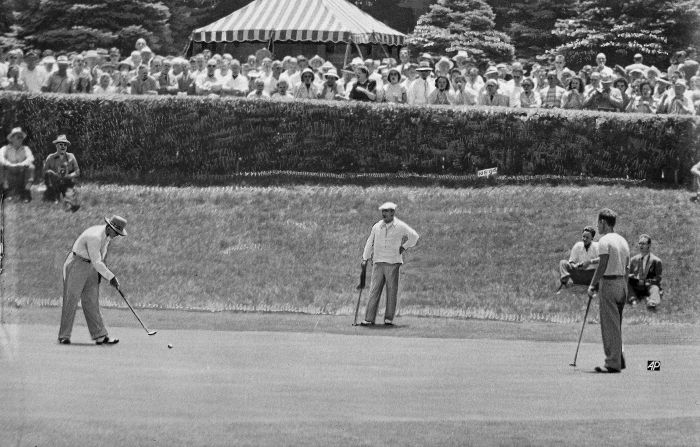
Sam Snead, US Open (1947) With seven major championships and 82 PGA Tour victories, Snead won pretty much everything there was to win across his legendary career -- except the US Open. A four-time runner up at the event, the American came within inches of capturing the elusive title in 1947. Having led Lew Worsham by two shots in an 18-hole playoff with three to play, Snead was pegged back heading into the final hole before missing his putt from inside three feet to lose.
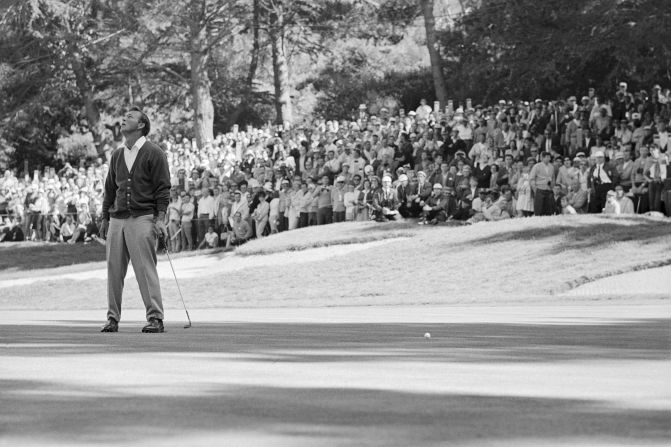
Arnold Palmer, US Open (1966) Even "The King" wasn't immune to a meltdown. Carrying a seven-shot lead into the back nine of the 1966 US Open, Palmer looked to be strolling towards an eighth career major in San Francisco, only to bogey five of the next seven holes as Billy Casper roared back to force an 18-hole playoff. The nightmare then repeated itself for Palmer, who started strong before dropping four shots across a three-hole stretch to lose out by four strokes to Casper.
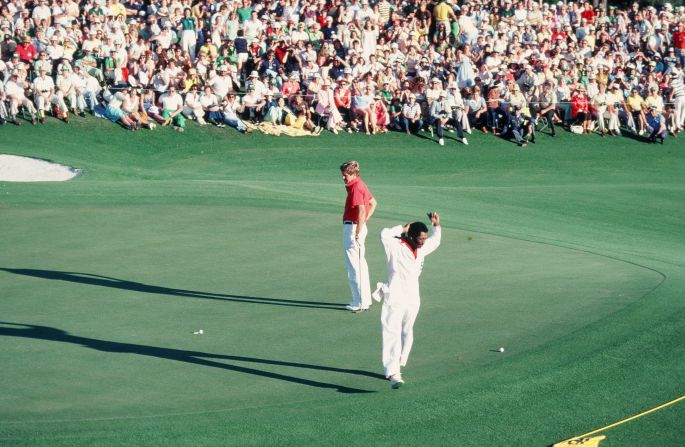
Ed Sneed, The Masters (1979) He wasn't related to Sam Snead, but Ed Sneed saw a major slip away in similarly catastrophic circumstances at The Masters in 1979. Three up with three to play, Sneed slumped to a trio of bogeys to fall into a sudden-death playoff at Augusta -- the first time the format had been used. Debutant Fuzzy Zoeller went on to clinch a one-stroke victory over Sneed and Tom Watson. While Watson would finish his career with eight major titles, including two Masters victories, 1979 would cruelly be the closest Sneed ever got to tasting major glory.
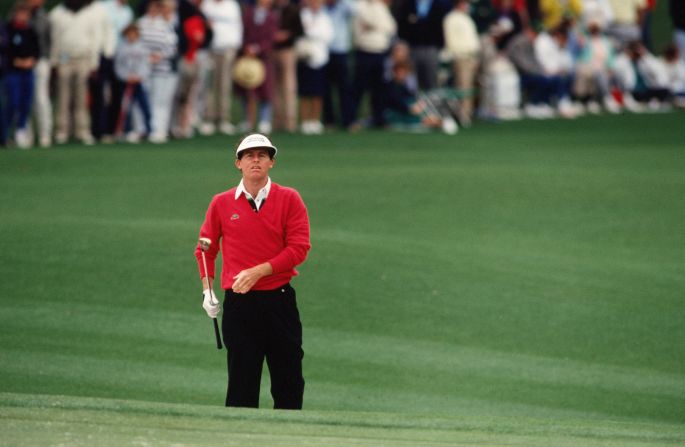
Scott Hoch, The Masters (1989) Based on the distance Hoch had to putt to win the 1989 Masters, Nick Faldo had two feet in the grave. Locked in a sudden-death playoff at Augusta's 10th hole, Faldo could only find the bunker with his approach, leaving Hoch with two bites at a 25-foot putt to win. The American's first effort took him to within two feet of glory, only for his second to roll agonizingly around the lip of the hole. In response, an exasperated Hoch launched his putter skyward. When Faldo birdied at the subsequent hole, Hoch's hopes of a first major win similarly went up in the air.
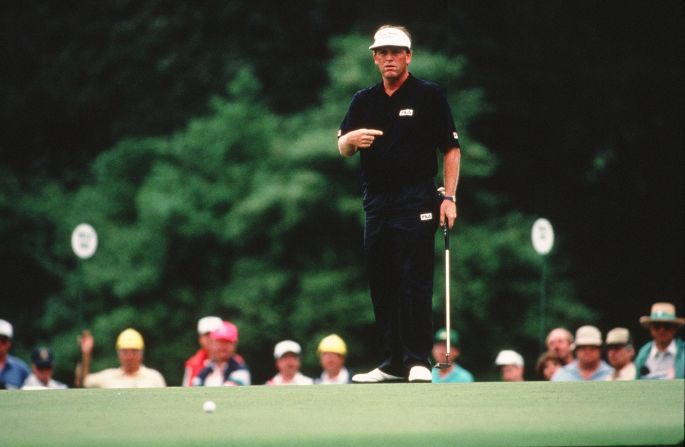
Mark Calcavecchia, Ryder Cup (1991) A traumatic meltdown with a happy ending, Calcavecchia was inconsolable after a collapse that he believed had cost his American team the 1991 Ryder Cup at Kiawah Island. Four up with four holes to play against Colin Montgomerie, the 1989 Open champion looked to be cruising to a crucial point, only to lose all four remaining holes as his Scottish opponent secured a vital half-point for Team Europe. A horrified Calcavecchia looked set to be the scapegoat of a bad-blooded tournament later dubbed "The War on the Shore," but Germany's Bernhard Langer spared his blushes by missing his six-foot putt that would have retained the Cup for Europe, sealing a 14 ½ - 13 ½ win for the US.
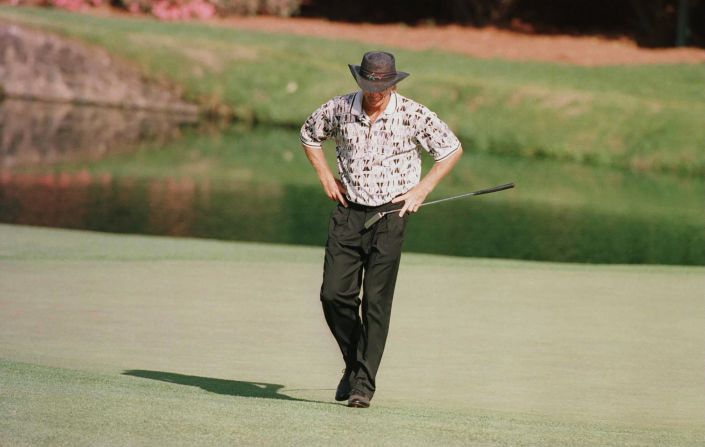
Greg Norman, The Masters (1996) Nicknamed "The Great White Shark," Norman saw defeat snatched from the jaws of victory at The Masters in 1996. Having led all three rounds and carrying a six-shot lead over Nick Faldo into the final round, the Australian still had a healthy four-stroke lead over the Englishman with 11 to play at Augusta. Faldo didn't even have to make a birdie to surge into a two-shot lead just four holes later, as Norman sunk with three straight bogeys and a double bogey. Norman bit back with two birdies over the next three holes, but his fate was sealed with another double bogey at the 16th, as Faldo cruised to his sixth major with a five-shot cushion.

Jean Van De Velde, British Open (1999) A meltdown in equal parts memorable and heart-breaking, Van De Velde's 18th hole tailspin at the 1999 British Open is one of the most famous implosions in sporting history. Having arrived at Carnoustie in Scotland as the world No. 152, Van De Velde teed off for the last time with a three-shot cushion; even a double bogey would have been enough to crown him as only the second Frenchman to lift the famous Claret Jug. What followed was the golfing equivalent of an anxiety dream, as the 33-year-old skewed his drive, hit his second shot bouncing off a grandstand into the rough, and then watched in horror as his third effort plopped into the Barry Burn. Pictures of Van De Velde -- still smiling -- stood ankle deep in the water weighing his options have since become the defining images of the tournament as the Frenchman, despite sinking his triple-bogey putt to force a playoff, saw his dreams of a first major usurped by Scotsman Paul Lawrie.
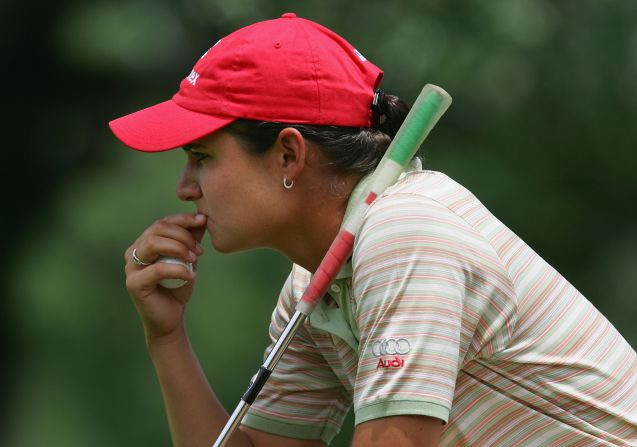
Lorena Ochoa, US Women's Open (2005) Ochoa secured a top-four finish at the 2005 US Women's Open. A good display, no? Not when you led at the final hole. The Mexican arrived at the par-four 18th tee at three-under, the score of subsequent winner Birdie Kim, only to skew her opening drive into the water. The 23-year-old eventually tapped in for seven and a triple bogey, finishing the day four shots adrift of the South Korean first-time winner. Ochoa would never get as close to winning the major, but was victorious at the Women's British Open in 2007 and the Chevron Championship in 2008.
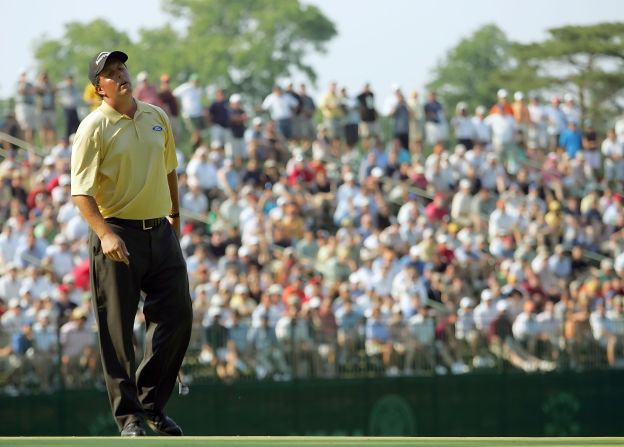
Phil Mickelson, US Open (2006) The US Open remains the only major Mickelson is yet to win, though not for the want of trying. A record-six-time runner-up at the tournament, "Lefty" has never come as close to breaking his duck as he did at Winged Foot in 2006 when, approaching the final hole, he just needed to make par to secure a third consecutive major win. Mickelson subsequently hit a hospitality tent and a tree en route to carding a double bogey which handed victory to Australian Geoff Ogilvy. "I just can't believe I did that. I'm such an idiot," Mickelson later told reporters.

Tom Watson, British Open (2009) A five-time Open champion, Watson was a closing par away from making it six and becoming -- at 59-years-old -- the oldest major winner in golf history, at Turnberry, Scotland, in 2009. To this day, the American believes he hit the "perfect" approach to the 18th green, only for strong winds to whisk his shot past the flag and into long grass. Watson rallied to bogey the hole, but was comprehensively defeated by compatriot Stewart Cink in the subsequent playoff.

Dustin Johnson, US Open (2010) A US Open champion in 2016, Johnson would come to have happy memories of the major -- eventually. The 2010 edition of the tournament at Pebble Beach left a distinctly sour taste in the American's mouth, as Johnson saw his three-shot final day lead evaporate with a disastrous triple bogey at the second hole, from which he never recovered. A double bogey at the following hole was followed by six more across a birdie-less final round, as Johnson finished five shots adrift of Northern Ireland's first-time major winner Graeme McDowell.
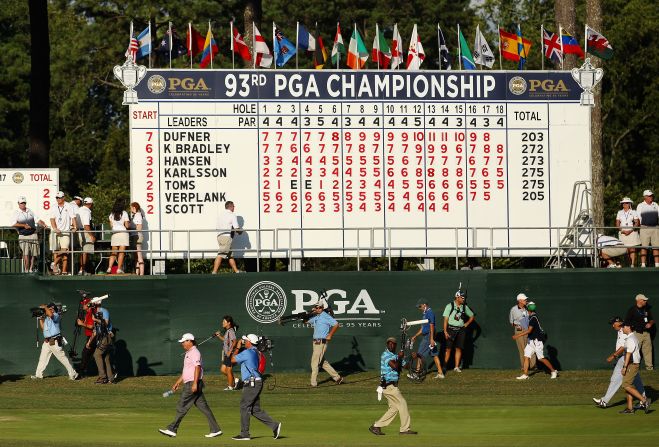
Jason Dufner, PGA Championship (2011) Bogey free after 14 holes, Dufner was a steady finish away from a first major and PGA Tour win at the 2011 PGA Championship in Atlanta. Yet after finding the water from the 15th tee, the American quickly saw his commanding five-stroke lead sink, bogeying three straight holes as rookie Keegan Bradley -- who had triple-bogeyed the 15th -- fired back-to-back birdies to force a playoff. Bradley completed his comeback to crush his compatriot's dreams, but Dufner would exorcise his demons with triumph at the 2013 PGA Championship in New York.
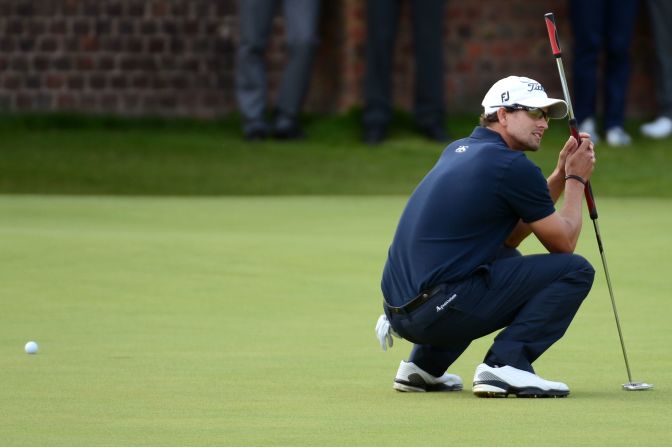
Adam Scott, British Open (2012) When Ernie Els returned to the Royal Lytham and St. Annes clubhouse on the final day of the 2012 British Open, it looked highly unlikely the South African would be back out to lift his second Claret Jug. Yet one Scott capitulation later, "The Big Easy" was doing exactly that, as the long-time Australian leader closed with four straight bogeys to squander a four-shot lead and lose by a single stroke.
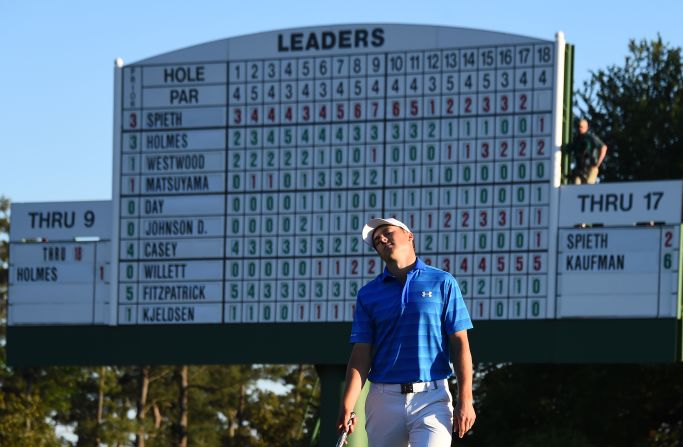
Jordan Spieth, The Masters (2016) "Buddy, it seems like we're collapsing," Jordan Spieth told his caddy. Having looked unstoppable in the defense of his 2015 Masters title, five shots clear at the 10th tee, the 22-year-old was spiraling towards an implosion of apocalyptic proportions. Back-to-back bogeys precluded an eye-watering quadruple bogey at the short 12th hole, opening the door for Danny Willett to capitalize and clinch his first major. To rub salt into the wounds, a devastated Spieth had to help the victorious Englishman into his new green jacket at the Augusta winner's ceremony.
![<strong>Lexi Thompson, US Women's Open (2021)</strong> The 2021 US Women's Open provided <a href="index.php?page=&url=https%3A%2F%2Fwww.cnn.com%2F2021%2F06%2F06%2Fgolf%2Fyuka-saso-us-womens-open-golf-spt-intl-hnk%2Findex.html" target="_blank">stories</a> both heart-warming and heart-breaking. Teenager Yuka Saso became the first Filipino player to win a golf major after conquering Japan's Nasa Hataoka in a playoff, yet neither player had looked to have a shot at victory a short while earlier. Thompson had led by four strokes at the turn, but a back-nine collapse saw her dreams of finally capturing an elusive second major crushed. A par at the final hole would have been enough to put the American into the playoff, but an agonizing missed putt [pictured] epitomized her painful afternoon in San Francisco.](https://media.cnn.com/api/v1/images/stellar/prod/230214103501-golf-meltdowns-thompson.jpg?c=original&q=h_447,c_fill)
Lexi Thompson, US Women's Open (2021) The 2021 US Women's Open provided stories both heart-warming and heart-breaking. Teenager Yuka Saso became the first Filipino player to win a golf major after conquering Japan's Nasa Hataoka in a playoff, yet neither player had looked to have a shot at victory a short while earlier. Thompson had led by four strokes at the turn, but a back-nine collapse saw her dreams of finally capturing an elusive second major crushed. A par at the final hole would have been enough to put the American into the playoff, but an agonizing missed putt [pictured] epitomized her painful afternoon in San Francisco.
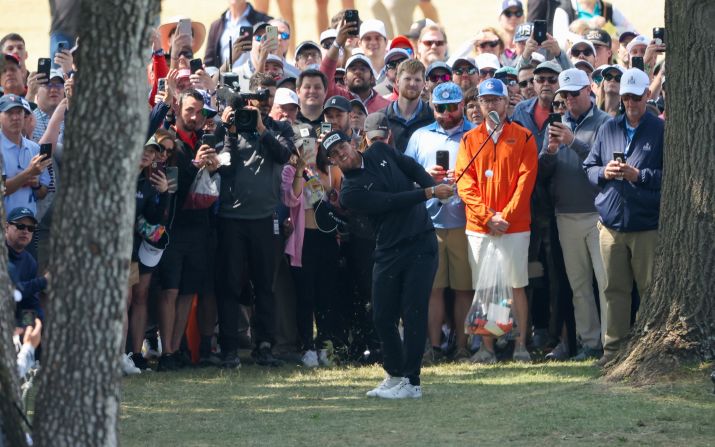
Mito Pereira, PGA Championship (2022) One hole. That's how close Mito Pereira was to a first major on his maiden PGA Championship outing in 2022. The world No. 100's fairy-tale story became a horror movie at Southern Hills Country Club in Tulsa as Pereira, leading by a shot, struck his tee drive into the water at the 18th hole. His eventual double bogey meant he missed out on the subsequent playoff, with Justin Thomas besting compatriot Will Zalatoris to lift his second career major.


